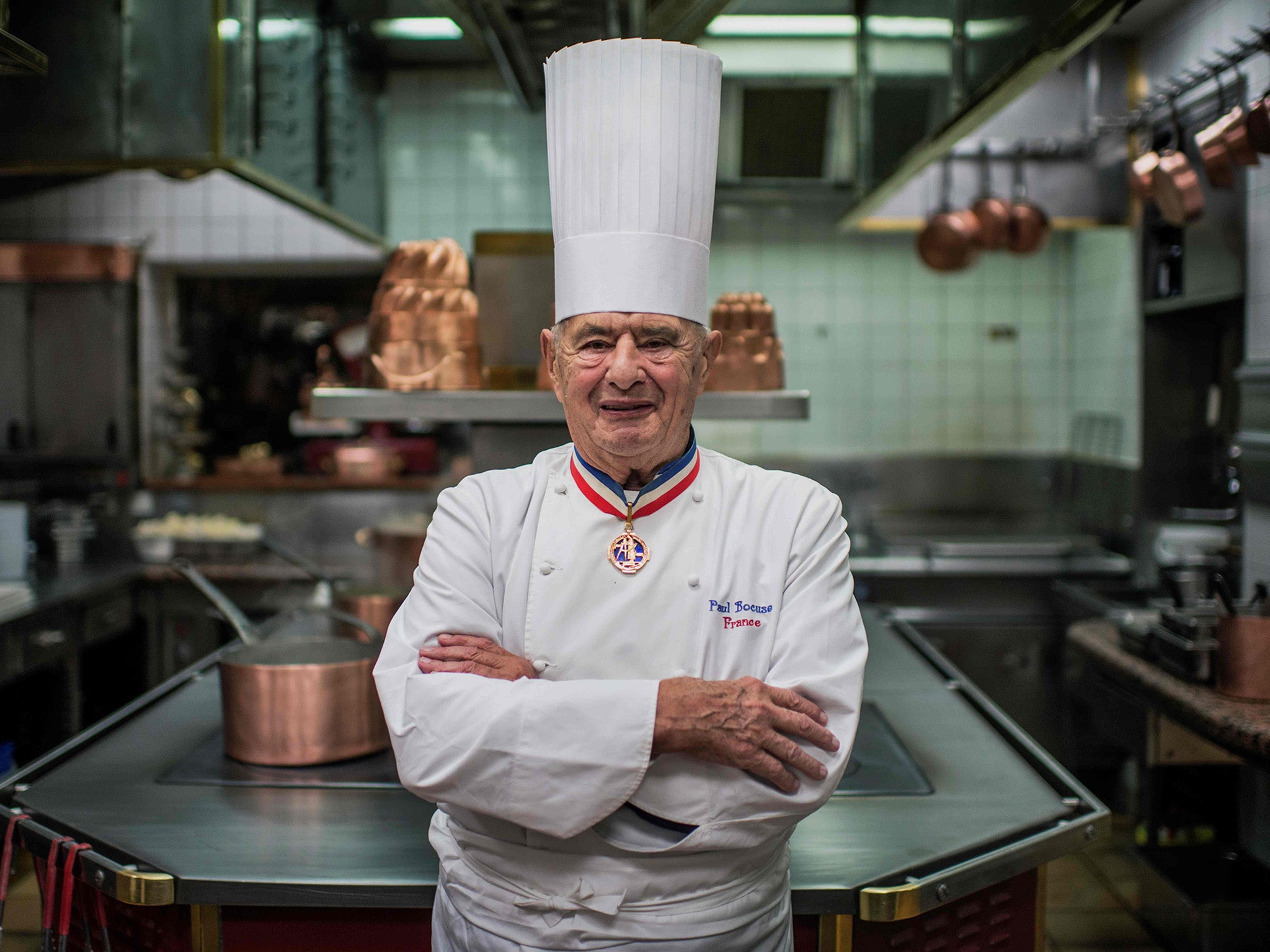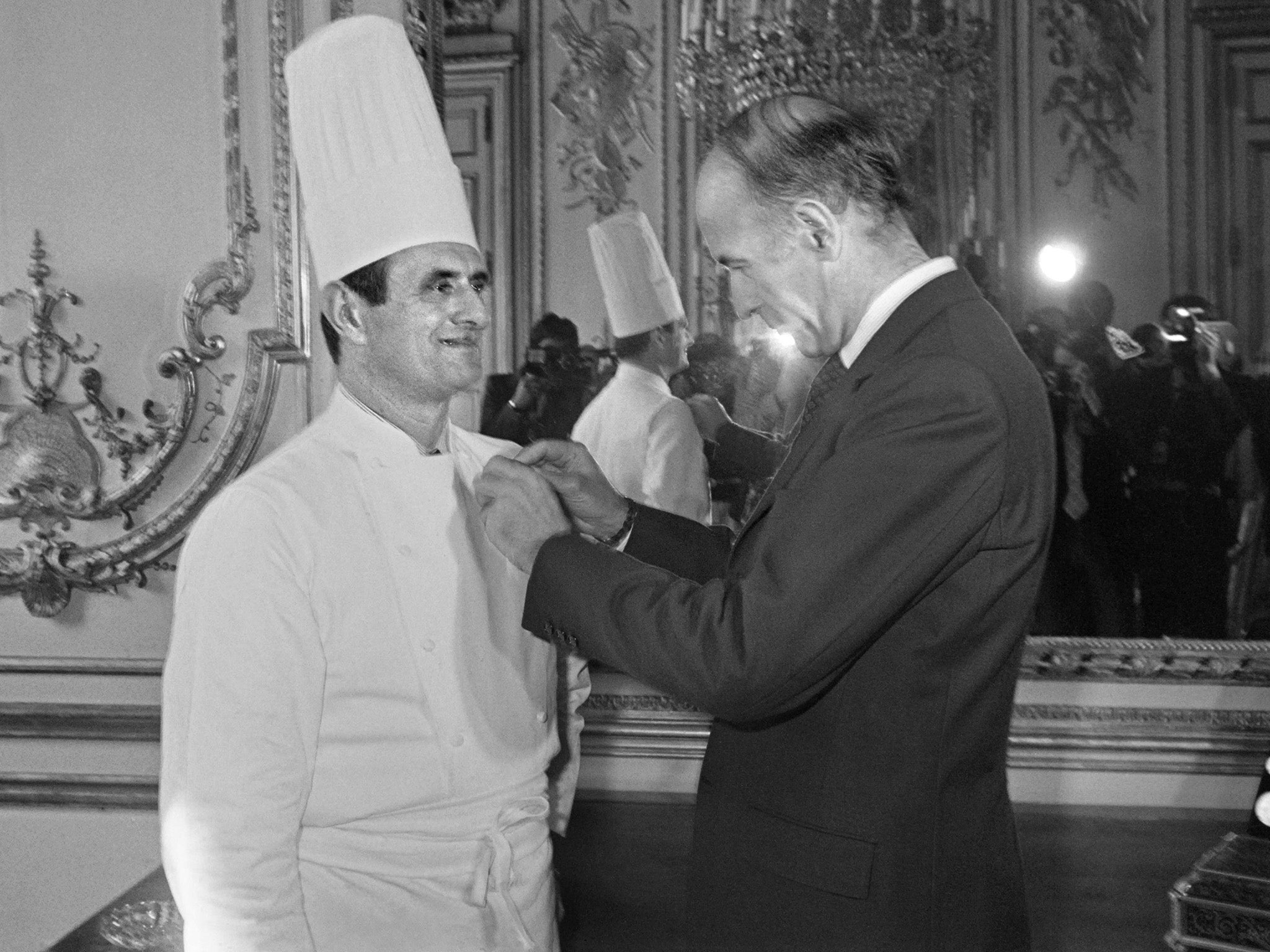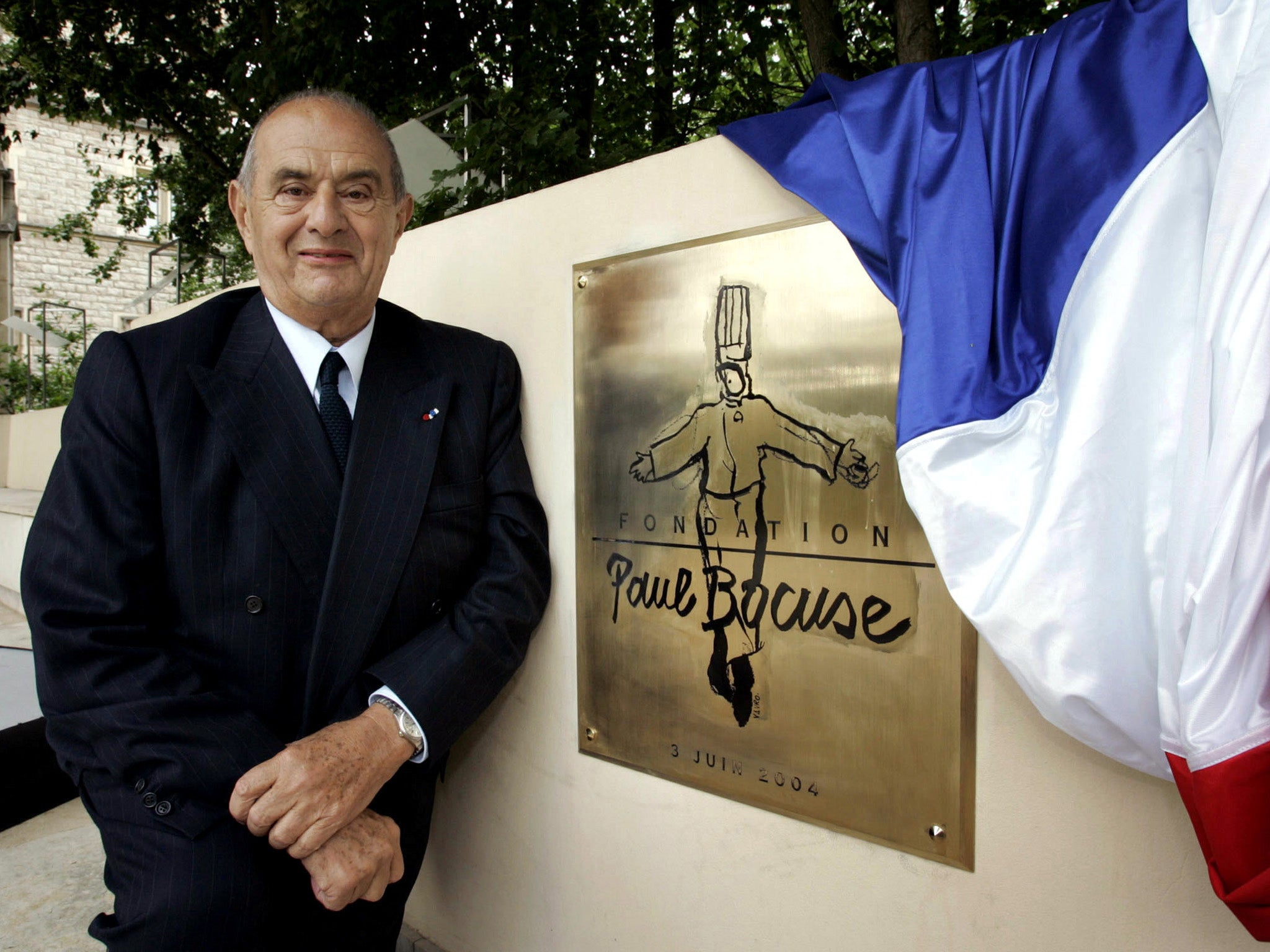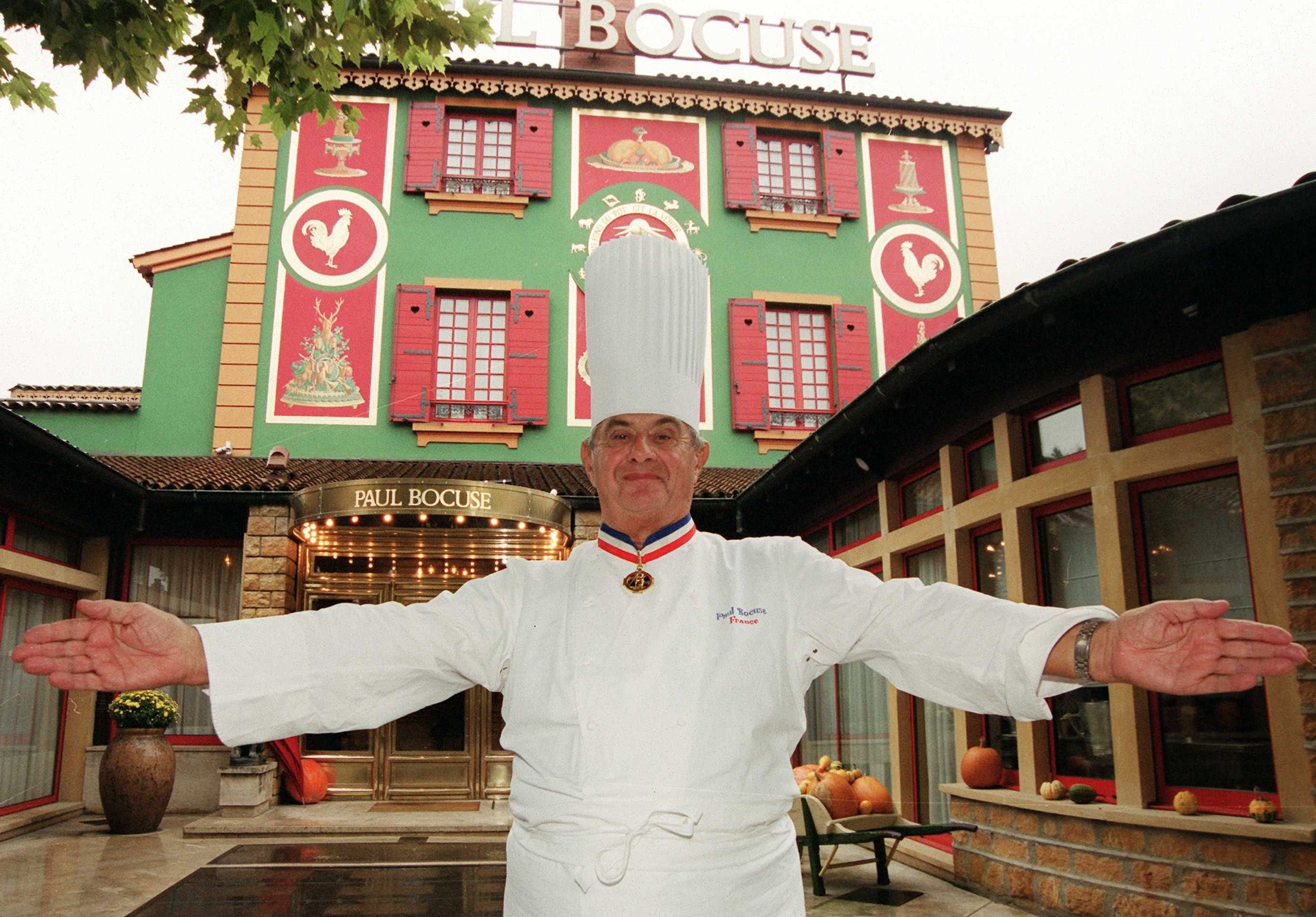Paul Bocuse: French chef with outsize personality who popularised nouvelle cuisine
He transformed his profession but his denigration of women did not endear him to everyone

Your support helps us to tell the story
From reproductive rights to climate change to Big Tech, The Independent is on the ground when the story is developing. Whether it's investigating the financials of Elon Musk's pro-Trump PAC or producing our latest documentary, 'The A Word', which shines a light on the American women fighting for reproductive rights, we know how important it is to parse out the facts from the messaging.
At such a critical moment in US history, we need reporters on the ground. Your donation allows us to keep sending journalists to speak to both sides of the story.
The Independent is trusted by Americans across the entire political spectrum. And unlike many other quality news outlets, we choose not to lock Americans out of our reporting and analysis with paywalls. We believe quality journalism should be available to everyone, paid for by those who can afford it.
Your support makes all the difference.“Food and sex have much in common,” Paul Bocuse told The Daily Telegraph in 2005. “We consummate a union, we devour each other’s eyes, we hunger for one other.” Adding that food and sexual intercourse were the essentials in life, he explained: “I realise my vision is a little macho, but I am a man of my time and believe that, whatever they say, women love men to be macho.”
In contrast to his cooking, Paul Bocuse’s outsize personality was not to everyone’s taste. A relentless self-promoter, he referred to himself in the third person and was not above decorating his restaurant with portraits of himself or stationing a life-size image of himself outside the entrance.
Unlike the chefs before him, he was not content to remain in the kitchen, striving to maintain the three Michelin stars that he first earned in 1965. He managed to to so for more than 50 years.
From the outset, Bocuse was keen to commercialise his offering, much to the dismay of traditionalists, decades before cooking shows, magazines and personalised cookware turned chefs into brands.
Bocuse was, after all, one of the first celebrity chefs, the French restaurateur who popularised nouvelle cuisine and its focus on the light and seasonal, with made to look like art on a plate.
Bocuse, who has died aged 91, co-founded restaurants at the Epcot centre in Florida and Disneyland Paris; and he was affiliated with nearly 20 others from Europe to Asia.
In 1969, he helped plan the menu for the inaugural Concorde flight, perhaps the first meal ever officially dubbed “nouvelle cuisine”. He wrote best-selling cookbooks and appeared internationally on TV cooking shows. Wine, jam, a salmon knife and other products bore his name.
Bocuse helped to transform a profession that for centuries had been little more than a gritty, hidebound trade in which kitchen secrets were guarded as state secrets. He famously hobnobbed with his peers, freely sharing his recipes and endearing himself to many younger chefs who would loosely form “La Bande à Bocuse”.
His home turf was Lyon, an area once known for its meres, matriarchal figures renowned for their homestyle bistros or bouchons.

Absorbing the lessons of those women and other chefs who crossed his path, Bocuse helped transform the city into one of the most decorated culinary destinations in Europe. In the process, he became the most influential French chef of his generation.
Despite having learned from women, he did not respect them as he might have.
Often considered a “phallocrat”, Bocuse routinely diminished a woman’s role in the kitchen, despite having studied under Eugénie Brazier, the first female chef to earn three Michelin stars. He told People magazine in 1976: “Women are good cooks, but they are not good chefs. Women who systematically want to do what men do just end by losing their femininity, and what I adore most of all is a feminine woman.”
An unabashed hedonist, he spoke openly about two long-term mistresses and a series of short affairs during his marriage.
Julia Child, the renowned American interpreter of French cuisine, once told People magazine that Bocuse was indeed “very macho, fun to be with and very amusing”. She said that in the kitchen “he has been tremendously important ... Most of the great chefs are grateful to him for all the publicity he gets, because they feel it has helped all of them.”
The late New York Times food critic Craig Claiborne became one of his most ardent defenders. “He is one of the finest ambassadors both of France and his profession,” Claiborne wrote in 1974, describing Bocuse as an “irrepressible clown who will dance on tables and at the climax of an evening toss champagne glasses into the air. He is also a gentleman, a highly complex human being who plays a calliope to amuse the world.”
Paul François Pierre Bocuse was born in Collonges-au-Mont-d’Or to a family of innkeepers and cooks dating to 1765. His grandfather’s financial carelessness had forced the family to sell its historic inn five years before Bocuse was born. For much of his youth, the Bocuses ran a smaller bistro and hotel half a mile from the inn.
During Second World War, he worked in the canteen and slaughterhouse of a Vichy-run youth camp. When he turned 18, he was conscripted into the Free French Forces and reportedly took gunfire to the chest. Nursed back to health at a US army hospital, where he received a blood transfusion, Bocuse showed his appreciation by flying an American flag outside his restaurant for decades.
After the war, he apprenticed near Lyon with Brazier and with his most enduring mentor, chef and restaurateur Fernand Point. Point helped liberate many promising young chefs from the traditions of Auguste Escoffier, a chef and author whose seminal work, Le guide culinaire, defined haute French cuisine in the early 20th century and for decades after his death in 1935.

Escoffier espoused rich sauces and ornate garnishes – the sort of touches that could overwhelm the freshest ingredients from the garden. Bocuse said Point taught him to guard “the integrity of the raw product”.
French cuisine had gone through many phases over the centuries, and the general characteristics of nouvelle cuisine – farm-fresh ingredients, shorter cooking times and delicate sauces – had already crept into the cuisine by the time Bocuse gained renown in the 1960s. But Bocuse, with his talents as a chef and tireless promoter, became its most public and quotable crusader.
His mission, he said, was to “render unto a chicken that which is its due, and nothing more”. Another time, he likened his cooking to a “slender young girl in a see-through blouse”, compared with the “heavily corseted 1900 beauties” of grand French cuisine.
Bocuse shunned the extremes of nouvelle cooking, such as the comically small portions, scarcely cooked vegetables and weirdly exotic food combinations. His dishes retained the sumptuous side of French cooking: shrimp soup with cream, butter and shallots; wild duck (that he had shot himself) in green pepper sauce; and tender pink saddle of lamb with eggplant galette.
After his training with Point, Bocuse returned to his family’s restaurant in 1956 and within a few years transformed the modest bistro into one of the world’s most venerated restaurants, L’Auberge du Pont de Collonges, often just called “Paul Bocuse”.
In 1961, he earned his first Michelin star. A second star followed in 1962, then a third in 1965, indicating that the restaurant, in the guide’s parlance, offers “exceptional cuisine” and is “worth a special journey”.
In 1975, French President Valéry Giscard d’Estaing bestowed on Bocuse the Legion of Honour. It was the first time the award had been given to a chef.
The ceremony was memorable for two reasons: Bocuse wore not a formal suit but his chef’s jacket and sky-high toque, and he used the occasion to introduce his black truffle soup under pastry shell, which would become a signature dish at his Lyonnaise restaurant.
With two colleagues, Bocuse opened his first American restaurant, Les Chefs de France, at Epcot in 1982. Bocuse’s son, Jérôme, now owns and runs the brasserie as well as a related upscale restaurant, Monsieur Paul, named for his father. Paul Bocuse teamed with Disney again in 2014 to open a bistro at the Paris theme park, Bistrot Chez Rémy, inspired by the animated feature film Ratatouille, about a rat who is a master chef.
In 2013, the Culinary Institute of America in Hyde Park, New York, renovated its formal Escoffier Restaurant and reopened it as the Bocuse Restaurant.
In 1987, Bocuse created the Bocuse d’Or, a cooking contest held every two years and featuring competing teams from 24 countries. In 1990, he opened a culinary arts school in Ecully, France.
Anthony Bourdain, a chef, author and TV personality, said: “There aren’t a lot of people who can be truly referred to as ‘great’ – as in Muhammad Ali great, Orson Welles great, Thomas Jefferson great. Paul Bocuse was great.”

Bocuse was married for more than 70 years to Raymonde Duvert, and identified Raymone Carlut and Patricia Zizza as his mistresses of many decades. Besides his wife, survivors include a daughter from his marriage, Françoise Bernachon of Lyon; and a son from Carlut, Jérôme Bocuse of Orlando, Florida.
“A lot is being made about my private life, and why not?” Bocuse told the Telegraph. “I adore women and we live too long these days to spend a whole life with only one. I work as if I will live to be 100, and I enjoy life as if the next day will be my last.”
Paul Bocuse, chef, 11 February 1926, died 20 January 2018
© Washington Post
Join our commenting forum
Join thought-provoking conversations, follow other Independent readers and see their replies
Comments